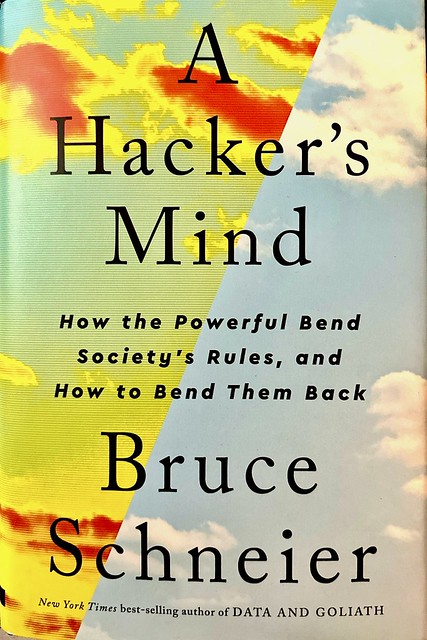2 minutes estimated reading time
I eagerly anticipated reading A Hackers Mind, being a long-time follower of Bruce Schneier’s blog. A Hackers Mind caters to the well-informed individual. Schneier commences by defining what constitutes a hacker, delving into the essence of hacking and its widespread prevalence.
Subsequently, Schneier takes us on a journey into a hackers mind, guiding us through fundamental hacks targeting:
- ATMs (automatic teller machines or cash machines)
- Casinos
- Airline frequent flier miles
- Sports systems
- Financial networks
- The legal realm
- Politics
Through these examples, Schneier aims to illustrate the parasitic nature of hacks on the systems they target, offering various techniques to impede or render them unfeasible. In doing so, he makes a broader socio-political statement about how the very foundation of the economy and society is continuously ‘hacked’.
The implication is that power lies in a hacker’s mind being applied to the systems that govern our lives. And that with the right mindset and ‘hack’ the ordinary person can turn the tables on those in power.
When this happens it makes great film or television. (A classic example of this would be ITV’s People vs. Post Office which told the story of postmasters combating wrongful prosecutions due to software defects. The reality was that in that particular case, it actually took the media coverage around the TV drama being shown to actually start moving the needle.)
Schneier in his book recognises that over time societies have evolved to become more equitable over time. He also attributes late stage capitalism to the hackers mindset, mixed with resources and technical capability in law or finance. The book is designed to wake the public up with a view to them also developing a A Hackers Mind and hacking the system back to equilibrium.
It’s an interesting light read, but I think VR pioneer and author Jaron Lanier writes better books focusing on the inequities inherent in the intersection of technology, culture and society. A great example of this is his book Who Owns The Future?
I don’t think Schneier gets close to inspiring his desired outcome with A Hacker’s Mind, but if you want something above the usual airport reading then it gets a thumps up from me, but it won’t be staying on my book shelf for me to re-read it at a later date. For more book reviews and recommendations go here. For recommendations of non-fiction books in particular go here.
